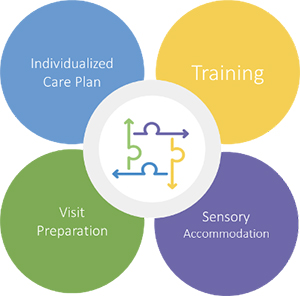Autism Friendly Initiative
April 28, 2021

|
Patients on the autism spectrum have various sensory and communication needs which can make the fast-paced and often over-stimulating hospital environment particularly challenging. In response, Boston Medical Center (BMC) launched the Autism Friendly Initiative in order to improve the healthcare experience for patients with autism spectrum disorder (ASD) and their families.
In order to better understand the specific challenges patients with ASD face, we have involved a range of stakeholder groups that meet routinely, including:
- Parent Leadership in Autism Network (PLAN)
- Hospital-wide Multidisciplinary Steering Committee
- Teens Educating, Advocating, and Consulting in Healthcare (TEACH)
- Scientific Advisory Board
In addition to our broad stakeholder involvement, our Initiative is committed to ensuring that all endeavors are guided by real-time monitoring and research evaluation. Some of our studies have included patient data analysis, ethnographic study of the experience of patients with ASD during outpatient encounters, evaluation of the efficacy of sensory toolboxes, and a modified Delphi study to gather consensus on best practices of an "autism friendly" healthcare environment.
The Autism Friendly Initiative has implemented a multi-pronged intervention strategy focused on four key domains:
- Individualizing patient care
- Providing support in preparation of visits
- Modifying the sensory environment
- Training clinicians, staff, and students
Individualizing Patient Care
The ASC is a telephone-administered survey which collects information about a patient's communication style, triggers, safety concerns, and de-escalation strategies. The summarized information is entered into a patient's electronic medical record and is readily visible to their care providers at BMC. Clinicians may also facilitate and log an ASC directly into their visit note, and automatically include information in their "after-visit summary" about ASD-related resources that are available to patients.
Visit Preparation
Our Autism Resource Specialist (ARS) team can assist families with care coordination needs, communication with clinicians, visit preparation materials, and can offer in-person visit support.
Our Healthcare Social Stories website utilizes social stories with built-in reinforcements to provide step-by-step instructions for a variety of medical procedures, including taking a COVID test, getting blood drawn, and having a physical exam, and getting an MRI/x-ray. Social stories are currently available in English and a growing library of additional languages.
Sensory Accommodations
The Autism Friendly Initiative provides sensory toolpacks and sensory toolboxes to departments across BMC. These sensory materials contain items helpful for calming, distracting, and redirecting patients with ASD during challenging medical encounters. These packs contain items such as coloring books & crayons, stress balls, sunglasses, bubbles, and light-up wands.
Education & Training
The Autism Friendly Initiative routinely trains the following cohorts at Boston University/Boston Medical Center:
- Predoctoral Dental Students
- Public Safety Officers
- Medical Students
- Medical & Dental Residents
- Genetic Counseling Students
- Interpreter Services
- and individual clinics and teams as requested
Trainings to both internal and external healthcare professionals include:
- Making Your Practice Autism Friendly: how to develop and maintain systems-level interventions like accommodating sensory needs and preparing patients for visits
- Helping Your Patient with Autism: provides practical strategies for clinicians and staff that care for patients with ASD and their families
- Resources, Resources, Resources: provides info on how to connect families with needed services, like public benefit enrollment and help with adulthood transition services
Our Initiative continues to expand upon the mission of delivering optimal healthcare to patients with ASD and their families. Future directions of the work include further developing our range of interventions to meet the ongoing needs of our patients, families, and providers, and further dissemination and partnership around emerging best practices within this community.







